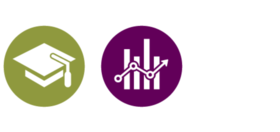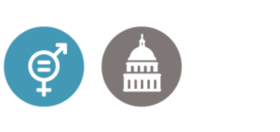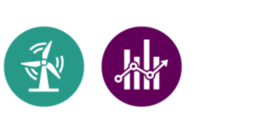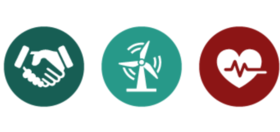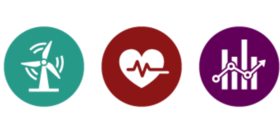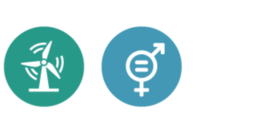Media Mentions
Site news
-
Battling the coronavirus ‘infodemic’ among social media users in Kenya and Nigeria
As featured in Nature, Faculty Affiliate Susan Athey is investigating low-cost scalable interventions to improve the quality of information circulating online.
March 18, 2024
-
Gretchen Daily: The cost of not valuing nature
In this episode on Radio New Zealand, Faculty Affiliate Gretchen Daily shares how traditional systems of wealth measurement don't include nature's contributions.
March 16, 2024
-
Heart disease risk factors detected in adults in low-income nations
The research serves as a crucial empirical foundation for addressing health disparities and improving outcomes for individuals in the poorest segments of global society.
March 15, 2024
-
Re-evaluating prevalence of risk factors for cardio-vascular disease among people in extreme poverty
A study debunks the belief that cardiovascular diseases are low among the poor; major risk factors have a significant prevalence across all sections, regardless of income.
March 14, 2024
-
A turning point in Nigeria’s fight against cervical cancer
Faculty Affiliate Ami Bhatt has been supporting Nigerian cervical cancer prevention efforts since 2015 alongside global partners and Stanford colleagues and students.
March 13, 2024
-
The prevalence of cardiovascular disease risk factors among adults living in extreme poverty
A study co-authored by Faculty Affiliate Pascal Geldsetzer, featured in Nature, could inform equity discussions for resource allocation and design of effective interventions.
March 13, 2024
-
How should political parties choose candidates?
In VoxDev, incoming Faculty Director Katherine Casey highlights an experiment in Sierra Leone, which sheds light on which systems of leadership selection are most effective.
March 13, 2024
-
How gender norms are perceived across the world
In VoxDev, Alessandra Voena highlights data that suggests aligning perceived and actual views may be a promising policy intervention to raise female labour force participation.
February 29, 2024
-
Global determinants of education reform
Faculty Affiliate Patricia Bromley speaks on a FreshEd podcast about the World Education Reform Database she co-developed.
February 18, 2024
-
Study reveals significant discrepancies in common poverty measurement approaches
A study co-authored by Faculty Affiliates Eric Lambin and Jenna Davis found almost no agreement among four widely used poverty measurement approaches.
February 05, 2024
-
An interview with Susan Athey, Founding Director of the Golub Capital Social Impact Lab at Stanford
A Medium audio interview with Faculty Affiliate Susan Athey describes how her lab uses technology and social science to improve the effectiveness of social sector organizations.
January 11, 2024
-
It takes a village: Using game theory to get farmers to fight deforestation
A new model co-built by Faculty Affiliate Erica Plambeck taps into the power of cooperation to promote sustainable palm oil production in Indonesia.
January 11, 2024
-
Could sisal leaves make sanitary napkins more sustainable in India?
A team led by Faculty Affiliate Manu Prakash has found the absorption capacity of a sisal-based material to be higher than those in commercial menstrual pads.
January 08, 2024
-
Meet the economist who wants the field to account for nature
Faculty Affiliate Gretchen Daily shares with MIT Technology Review her work on making the environment more of an element in economic decision-making.
December 26, 2023
-
Global population profile of tropical cyclone exposure from 2002 to 2019
Faculty Affiliate Eran Bendavid aims to identify mitigation strategies and assess the global burden and future risks of tropical cyclones, as per his article in Nature.
December 20, 2023
-
A world unprepared: Missing skills for development
In VoxDev, Faculty Affiliate Eric Hanushek and co-authors address questions around the United Nations' Sustainable Development Goal of universal quality education.
November 24, 2023
-
How to stop turmeric from killing people
The King Center's initiative on lead was featured in The Economist for their research which led to a complete elimination of lead-contaminated turmeric in Bangladesh.
November 02, 2023
-
Skill versus voice in local development
Incoming Faculty Director Katherine Casey discusses if delegation to technocrats or inclusive decision-making can improve local development outcomes in Sierra Leone.
November 01, 2023
-
What do EV batteries have to do with health?
The center's initiative on reducing lead exposure combined epidemiology and management to confront a growing threat from lead-acid batteries in electric vehicles.
October 12, 2023
-
Stanford researchers investigate human trafficking alongside Brazilian partners in the Amazon rainforest
Members of a King Center initiative investigate possible trafficking sites in Brazil while working to expand an AI database designed to find illegal camps more efficiently.
September 18, 2023
-
Students devote their summer to combating human trafficking in Brazil
King Center undergraduate research assistant Thay Graciano spent her summer in Brazil with faculty members and researchers of the Stanford Human Trafficking Data Lab.
September 18, 2023
-
'Getting a handle' on a potent climate threat
Faculty Affiliate Alison Hoyt is working in a multidisciplinary team of researchers across Stanford to measure emissions of a potent greenhouse gas in extreme conditions.
September 14, 2023
-
Malnutrition early in life sets stage for poor growth and death
A study co-authored by Jade Benjamin-Chung reveals better nutrition during pregnancy and childbearing years is critical to protect children in their first 1,000 days.
September 13, 2023
-
They got the lead out of turmeric!
Affiliated researcher Jenna Forsyth and Faculty Affiliate Stephen Luby worked with the Bangladesh Food Safety Authority to eliminate lead-contaminated turmeric in the country.
September 13, 2023
-
Stanford research exposes toxic lead used to enhance color of turmeric
A King Center-supported initiative successfully reduced lead adulteration in turmeric in Bangladesh from 47% to 0% in two years.
September 13, 2023
-
Indian groundwater depletion rates could triple in coming decades as climate warms
A study co-authored by Faculty Affiliate David Lobell shows that the intensifying withdrawal of groundwater for irrigation by farmers in India threatens food and water security.
September 01, 2023
-
Growing solutions to childhood stunting
King Center undergraduate research assistant Claire Morton and Faculty Affiliate David Lobell investigated how adding minerals to farmland soil affects children's health.
August 30, 2023
-
Another payoff from trading stocks: Reducing political polarization
The Conflict and Polarization initiative examined whether engaging in trade can deepen trust by encouraging Israelis to invest in a range of Israeli and Palestinian companies.
August 28, 2023
-
Benefits of electric stoves on health and environment in Ecuador
Faculty Affiliate Marshall Burke and former Postdoctoral Fellow Brandon de la Cuesta studied the impacts of a program in Ecuador that put induction stoves in 750,000 households.
August 15, 2023
-
Experts discuss how environmental changes are altering the risk for mosquito-borne diseases
In Stanford News, Faculty Affiliates Erin Mordecai and Desiree LaBeaud discuss what we know and how communities can protect themselves from these changing disease threats.
August 08, 2023
-
Tuberculosis in prisons poses broader problems
Faculty Affiliate Jason Andrews, who has been researching tuberculosis in Brazilian prisons, discusses why treating TB in prison is critical to combatting the disease worldwide.
July 20, 2023
-
The vice of spice: Confronting lead-tainted turmeric
A King Center-supported initiative focused on reducing lead exposure was featured in Undark for their research in Bangladesh, which resulted in government intervention.
July 19, 2023
-
Rosenkranz Prize winners: Helping children grow in Bangladesh and preventing blindness in West Africa
Faculty Affiliate Jade Benjamin-Chung was awarded the Dr. George Rosenkranz Prize by the Freeman Spogli Institute for International Studies and Stanford Health Policy.
June 30, 2023
-
How gender norms are perceived across the world
Faculty Affiliate Alessandra Voena and her co-authors write in CEPR about their findings on the misconceptions of gender norms across the world.
June 29, 2023
-
Pain, no gain: Healthcare gender gaps still remain, especially in India
Faculty Director Pascaline Dupas shares insights from her recent working paper analyzing the state health insurance program in Rajasthan, India.
June 15, 2023
-
Changing tides
Research funding recipient Ceyenna Tillman shares what led her to study the oceans, and why the next generation of ocean scholars must define the field more broadly.
June 08, 2023
-
Getting to know Huggy Rao
Learn how this organizational sociologist is constantly cooking up new ideas to inspire curiosity and generosity — for himself and others — in the kitchen and the classroom.
June 05, 2023
-
Beyond climate dread
Faculty Affiliates Stephen Luby, Desiree LaBeaud, and Jade Benjamin-Chung discuss their work in finding solutions to the urgent problems of planetary and human health.
June 02, 2023
-
The spice seller's secret
Faculty Affiliate Stephen Luby and affiliated researcher Jenna Forysth discuss their research on hunting for the sources of lead poisoning in Bangladesh.
June 02, 2023
-
Just add prawns
Faculty Affiliate Giulio De Leo's research on schistosomiasis, a parasitic disease, takes him to the Senegal River, where introducing prawns may help combat the parasite.
May 08, 2023
-
Bureaucratic nepotism: Evidence from Colombia
Postdoc Juan Felipe Riaño writes in VoxDev that family ties to non-elected bureaucrats distort public employment outcomes, and standard anti-nepotism policies are ineffective.
April 25, 2023
-
Empowering patients with information to improve hospital accountability
In a new study in Rajasthan, Faculty Director Pascaline Dupas investigates whether informing patients of their benefits helps hold hospitals accountable.
April 24, 2023
-
The future of mosquito-borne diseases
Faculty Affiliate Erin Mordecai explains why warmer and wetter weather will mean more tropical illnesses far beyond the tropics.
April 07, 2023
-
Getting to Know Jesper Sørensen
Meet the organizational sociologist, avid indoor rower, New England Patriots fan, mystery lover, and K-drama fan (at least while he’s rowing his 10,000 daily meters).
April 05, 2023
-
Study finds trash, household crowding increase risk for three dangerous, mosquito-borne illnesses in Kenya
With the risk of mosquito-borne disease expected to grow with climate change, Faculty Affiliate Desiree LaBeaud reveals the factors that put communities at risk for such illnesses.
April 03, 2023
-
Rural underemployment threatens China’s growth
Only a handful of economies have risen from middle- to high-income status, Faculty Affiliate Scott Rozelle examines how China compares to other middle-income countries.
March 30, 2023
-
Accelerating water solutions: Stanford expert discusses surprising freshwater challenges and potential solutions in the U.S. and abroad
Faculty Affiliate Jenna Davis on water and sanitation challenges: “A lot of the obstacles have nothing to do with technology and very little to do with money or knowledge.”
March 21, 2023
-
Can psychosocial interventions make anti-poverty programs more cost-effective? Evidence from Niger
Stanford postdoctoral scholar Catherine Thomas writes in VoxDev how special "graduated" interventions were found to be effective.
February 16, 2023
-
From emerging to developed markets: How entrepreneurs can pick the right strategy
A recent study of Chinese entrepreneurs identifies the strategies that are required for success at different stages of a country’s transition to a market economy.
January 09, 2023
-
The Logic of Governance in China | A conversation with Xueguang Zhou
Professor Xueguang Zhou talks about his new book that sets out to answer this question, 'The Logic of Governance in China: An Organizational Approach'.
December 13, 2022
-
The lifesaving benefits of convenient infrastructure: Evidence from Bangladesh
Research by PhD student Nina Buchmann shows that physical proximity to pathogen-free water sources reduces child and adult mortality.
December 05, 2022
-
Targeted interventions by private and public sector are redefining healthcare
Professor Pascaline Dupas' research on the link between health and education in India is featured in APN News.
November 30, 2022
-
Detecting modern-day slavery from the sky
Using AI to analyze satellite images, researchers say it’s possible to spot illegal deforestation and forced labor in the Amazon rainforest.
August 26, 2022
-
Screening for a deadly virus in livestock milk
Research by Faculty Affiliate Desiree LaBeaud made a surprising discovery in Kenya: A sample of fresh milk harbored the deadly virus that causes Rift Valley fever.
August 11, 2022
-
Expanding access to clean water for the rural poor: Evidence from Malawi
Research by Faculty Affiliate Pascaline Dupas shows that offering coupons for free chlorine is an effective way to increase water treatment and prevent waterborne diseases.
August 10, 2022
-
Direct and spillover effects of access to health insurance in India
Demand for insurance is high even at the actuarially fair price and receiving it alongside peers increases utilization, yet health effects are elusive.
July 06, 2022
-
How satellites and AI can fix development data problems
Researchers of the Data for Development initiative introduce machine learning applied to satellite imagery as a solution to measuring sustainable development globally.
June 24, 2022
-
Four questions for Desiree LaBeaud
The Stanford epidemiologist and King Center Faculty Affiliate reacts to recent news about the effects of plastic on human health.
May 19, 2022
-
Solar technology and community engagement team up to help low-income farmers in India
Affiliated researcher Michael Machala, PhD '17, developed a solar-powered technology to improve the quality and quantity of dried agricultural produce in India.
April 18, 2022
-
5 Questions with Gary Darmstadt on improving outcomes for infants worldwide
Faculty Affiliate Gary Darmstadt talks about improvements in the infant mortality rate worldwide and what work remains to be done.
March 17, 2022
-
Urban water disinfection and mortality decline: Evidence from Mexico
Ageing pipe systems and the absence of complementary sanitation investments compromise the health benefits of water disinfection research from King Center Faculty Affiliates show.
March 11, 2022
-
Stanford engineers reveal how to optimize processes for transforming sulfur in wastewater to valuable materials
Promising technologies for converting wastewater into drinkable water produce a chemical compound that can be toxic, corrosive and malodorous.
March 03, 2022
-
Changing infant care to improve newborns’ health in India
Modifying traditional infant massages led to more weight gain and fewer illnesses among newborns in a Stanford-led community study in India.
February 28, 2022
-
5 Questions: Ami Bhatt on gut microbiomes in understudied populations
The Stanford Medicine professor on why it’s important to better understand the microbiome of people transitioning from traditional to Westernized lifestyles.
February 24, 2022
-
COVID-19 disproportionately affected marginalized and rural populations in Asia, new study shows
Karen Eggleston documents how the pandemic’s broad social and economic consequences negatively affected population health well beyond those directly suffering from COVID-19.
January 26, 2022
-
Podcast: Jessica Ray and William Tarpeh on clean water, turning trash into treasure, and life as assistant professors
These environmental engineers tell Stereo Chemistry about their visions for the future of our water . . . and share some laughs along the way
December 21, 2021
-
Tracking the spread of tuberculosis in Brazilian prisons
Stanford infectious disease expert Jason Andrews has spent years studying the spread of tuberculosis in crowded Brazilian prisons and surrounding communities.
December 16, 2021
-
5 questions with Dr. Marshall Burke on the costs of climate change
Faculty Affiliate Marshall Burke has focused his research on quantifying the social and environmental impacts of climate change.
November 10, 2021
-
How trade triggers innovation
Research by Faculty Affiliate Christopher Tonetti shows that competition from imports pushes domestic laggards to adopt more efficient practices and technologies.
November 09, 2021
-
China's new carbon market aims to substantially reduce its emissions. Here's how
Faculty Affiliate Lawrence Goulder writes for the World Economic Forum about China's new carbon market, the world's largest.
November 09, 2021
-
Many more Africans are migrating within Africa than to Europe
A new study by the Immigration Policy Lab shows that some governments are trying to make moving easier within Africa.
October 30, 2021
-
Timing is everything: Stanford researchers reveal why the right sequence of policies is essential to slow deforestation
Policy interventions to stop deforestation are most effective when enacted in a certain order, according to a new Stanford study.
October 27, 2021
-
Do voters hold politicians accountable for vote-buying?
Research in Kenya by Faculty Affiliate Dana Foarta shows that when voters receive payments, politicians are given greater leniency, and in turn steal more.
October 20, 2021
-
Designing markets for faster, better vaccines
Susan Athey and a team of economists have been pushing for an unprecedented expansion of vaccine capacity.
October 19, 2021
-
Stanford-led research underscores pollution’s impact on child health
A new analysis by Faculty Affiliates Stephen Luby and Michael Biaocchi finds evidence of a link between air pollution and children’s respiratory health in low-income settings.
October 12, 2021
-
We did the research: Masks work, and you should choose a high quality mask if possible
Masks, especially surgical ones, substantially reduce the risk of getting Covid-19 says Faculty Affiliate Stephen Luby.
September 26, 2021
-
Women left behind: Gender disparities in health insurance utilization in India
Gender-targeted strategies are needed to improve health care for women under India’s universal medical insurance program.
September 24, 2021
-
State capacity, taxation and development with Augustin Bergeron
Postdoctoral Fellow Augustin Bergeron discussed his research on tax collection in the Democratic Republic of Congo on the InequaliTalks Podcast.
September 16, 2021
-
Why the world should be worried about India’s Nipah virus outbreak
Faculty Affiliate Stephen Luby talks about the deadly Nipah virus outbreak in India and why it should concern everyone.
September 12, 2021
-
Surgical masks reduce COVID-19 spread, large-scale study shows
Researchers found that surgical masks impede the spread of COVID-19 and that just a few, low-cost interventions increase mask-wearing compliance.
September 01, 2021
-
A new breed of crisis: War and warming collide in Afghanistan
Unrest and climate change are creating an agonizing feedback loop that punishes some of the world’s most vulnerable people.
August 30, 2021
-
How states shape private governance
Affiliated Researcher Shelby Grossman speaks with Nigeria's The Avalon Radio about her new book on private governance in Lagos markets.
August 23, 2021
-
Improving state effectiveness through bureaucrat assignment: Evidence from the Democratic Republic of Congo
Postdoctoral Fellow Augustin Bergeron finds that optimizing the assignment of tax collectors significantly increases tax revenue and compliance at little or no added cost
August 20, 2021
-
Three ways to promote savings among low-income families
A recent The Times of India article highlights research by Pascaline Dupas suggesting that even when banking is accessible, families still do not open savings accounts.
August 20, 2021
-
Stanford’s Erik Jensen on the future of legal education in Afghanistan
Faculty Affiliate Erik Jensen discusses the state of legal education in Afghanistan amid the withdrawal of troops from the still struggling country.
August 10, 2021
-
Protecting health care workers in low-resourced Bangladesh
Faculty Affiliates Michele Barry, Stephen Luby, and Manu Prakash are working to protect health care workers in low-resourced Bangladesh.
August 09, 2021
-
The professor who assigns value to nature — then persuades world leaders to save it
Gretchen Daily is a pioneer in the field known as “natural capital.” Using science and software, she shows stakeholders why it benefits everyone to prioritize conservation.
July 30, 2021
-
Gaokao, ability, and occupation choice
In China, the college entrance exam score is predictive for both firm success and wage-job success in the future, yet higher-score individuals are less likely to create firms.
July 28, 2021
-
How to understand Chinese politics through data
Political scientist Yiqing Xu explains his “new-ish” methods for studying the dynamics of politics in China.
July 22, 2021
-
A new validated tool helps predict lifetime health outcomes for prediabetes and type 2 diabetes in Chinese populations
Faculty Affiliate Karen Eggleston developed a new simulation model to tackle diabetes and prediabetes among Chinese and East Asian populations.
July 13, 2021
-
In China, better financial coverage increases health care access and utilization
Research by Faculty Affiliate Karen Eggleston indicates that enhanced financial coverage for catastrophic medical expenditures increased health care access.
July 06, 2021
-
"They don't see their work as surveillance": Jennifer Pan on Chinese Welfare and Society
Faculty Affiliate Jennifer Pan talks about her new book "Welfare for Autocrats: How Social Assistance in China Cares for Its Rulers."
June 30, 2021
-
Stanford explainer: Social cost of carbon
In a Q&A, Stanford economists discuss the importance of this number and its role in creating environmental policies.
June 07, 2021
-
Getting the best election candidates: Are voters better off choosing directly or delegating to party leaders?
A recent paper in the American Economic Review by Faculty Affiliate Katherine Casey examines candidate selection in Sierra Leone elections.
June 04, 2021
-
Of viruses and vectors
Research by Faculty Affiliates Desiree LaBeaud and Erin Mordecai is featured in Stanford Magazine about disease transmission between insects, animals, and humans.
May 03, 2021
-
How COVID-19 disproportionately impacts people with chronic conditions in India
A study by Faculty Affiliate Karen Eggleston documents the adverse effects of COVID-19 on people with chronic conditions in India.
April 28, 2021
-
Stanford study identifies another explanation for the ‘marriage premium’
Faculty Affiliate Florencia Torche uncovers evidence to show the benefits of marriage to child development.
April 14, 2021
-
Women left behind — Rajasthan health insurance scheme has a gender gap: Study
In an opinion piece, Faculty Director Pascaline Dupas outlines her study of Bhamashah Swasthya Bima Yojana, a government health insurance program.
April 08, 2021
-
When nonviolence failed: Hunting for the secret list of leaders of India’s wartime struggle
In Broadstreet, Faculty Affiliate Saumitra Jha considers when nonviolence has failed in India.
April 02, 2021
-
The economics of falling populations
Fewer people means fewer ideas: The Economist highlights a recent paper by Faculty Affiliate Chad Jones on the unintended consequences of a declining population.
March 27, 2021
-
Stanford economist and others assess aquaculture’s promise and peril
Despite aquaculture’s potential to feed a growing world population, the industry has been plagued by questions about its environmental impacts.
March 24, 2021
-
Are group-specific arrangements in India’s criminal justice system more effective?
Postdoctoral Fellow Nirvikar Jassal writes in The Hindu Business Line about his research on representation in India's criminal justice system.
March 12, 2021
-
The benefits of acing China’s most important academic exam
High scorers in the gaokao go to better universities and earn higher wages says Faculty Affiliate Hongbin Li.
February 23, 2021
-
The unintended impacts of formal credit programs on social networks: Evidence from India
The introduction of financial institutions in communities may generate long-lasting externalities, says Faculty Affiliate Arun Chandrasekhar.
February 17, 2021
-
Closing the COVID trust deficit
Economists have developed an emerging body of evidence that holds important lessons for overcoming COVID-19 information constraints and building trust in health systems.
February 15, 2021
-
Jennifer Pan on China's social assistance
Faculty Affiliate Jennifer Pan examines how China's major social assistance program, dibao, has been used to quell dissent.
January 28, 2021
-
Stanford course explores how diseases have shaped human history
In a seminar course taught by Faculty Affiliate Erin Mordecai, students explored how vector-borne diseases have influenced history.
January 27, 2021
-
Heroes and villains: How networks of influential individuals helped destroy one of the world’s most durable democracies and legitimize a racist, authoritarian state
Faculty Affiliate Saumitra Jha discusses how networks of influential individuals helped destroy one of the world’s most durable democracies.
January 17, 2021
-
Linking piped water to equality
Stanford researchers find installing piped water near homes promotes gender equality and improves well-being in rural Zambia.
January 14, 2021
-
Lessons in inequity from a global health study
A large public health program in rural India improved maternal and child health in its pilot phase, but was at risk of leaving behind the most-disadvantaged participants.
January 06, 2021
-
How does shame and embarrassment impact social learning? Evidence from India
People are less likely to ask questions in their communities if it exposes the limits of their knowledge, says Faculty Affiliate Arun Chandrasekhar.
January 06, 2021
-
Trust in Medicine
In Broadstreet, Postdoctoral Fellow Sara Lowes examines recent work in economics that explores how historical experiences shape trust in medicine and vaccination rates.
December 28, 2020
-
Syria and some host governments want refugees to go home. What do refugees think?
Survey data from the Immigration Policy Lab and the King Center's Migration & Development Initiative shows that many refugees may be reluctant to return home.
December 24, 2020
-
How China’s ‘dibao’ social safety net is being used to silence dissent, according to one researcher
China’s minimum living standard guarantee, known as ‘dibao’, was conceived as a social safety net, but over time it has transformed into a means to control 'targeted populations.'
December 19, 2020
-
How to prevent diabetes and other chronic diseases cost-effectively
Addressing the epidemic of chronic diseases in India and other low- and middle-income countries requires comprehensive evidence on the cost-effectiveness of health interventions.
December 09, 2020
-
Postdoctoral Fellow Spotlight: Radhika Jain on reducing inequalities in health care and outcomes
Radhika Jain, a King Center affiliated researcher, shares her insights into India's healthcare system and how the country is responding to COVID-19.
December 07, 2020
-
Marshall Burke on The Daily Show with Trevor Noah
Faculty Affiliate and Earth System Science professor Marshall Burke spoke with Dulcé Sloan, a correspondent for The Daily Show, about the economic cost of climate change.
November 30, 2020
-
Human beings live longer, can healthcare systems keep up?
Faculty Affiliate Karen Eggleston spoke with BusinessWorld about the challenges of longevity on healthcare systems.
November 20, 2020
-
China’s rural population will play an instrumental role in its economic future
Faculty Affiliate Scott Rozelle explains why China’s wealth gap may make the transition from a middle- to high-income country more difficult than it seems.
November 17, 2020
-
Viral lessons: What a little-known virus could teach us about COVID-19
Stanford epidemiologist and Faculty Affiliate Stephen Luby discusses surprising results of a recent study on the Nipah virus and how it could inform the response to COVID-19.
November 11, 2020
-
Don't let politics poison the workplace: Some advice from business school experts
Stanford Graduate School of Business (GSB) professors and King Center Faculty Affiliates Saumitra Jha and Hayagreeva Rao offer guidance on how to minimize workplace confrontations.
November 10, 2020
-
Accessible healthcare could be key to solving climate crisis, according to Stanford researchers and others
Caring for people’s health is a prescription for protecting rainforests, slowing climate change and creating significant monetary value, according to a new Stanford-led study.
October 29, 2020
-
Stanford South Asia podcast - Nirvikar Jassal
Postdoctoral Fellow Nirvikar Jassal discusses his research on policing in India.
October 16, 2020
-
Excess deaths among dialysis patients
A study by King Center Faculty Director Pascaline Dupas and Postdoctoral Fellow Radhika Jain shows a 25% rise in mortality during lockdown.
September 22, 2020
-
New King Center faculty director talks future plans, research during COVID-19
Economist Pascaline Dupas spoke with The Stanford Daily about her plans for the King Center during her term as Faculty Director.
September 21, 2020
-
Learning management through matching: Experimental evidence from Ethiopia
Evidence from Ethiopia shows that interning in a management role for a month leads to higher wage earnings and can help some people run profitable businesses.
September 18, 2020
-
Another unity government won’t solve Lebanon’s crisis
Graduate student Christiana Parreira writes in the Washington Post about her research showing that ideologically opposed parties rarely share power well.
August 20, 2020
-
Intra-household and intra-personal constraints to women’s employment in India
Low self-confidence may keep women from persuading family members that they should enter the workplace, despite wanting to work themselves.
July 20, 2020
-
Trump-era racist rhetoric makes Chinese students in the U.S. less supportive of democracy
A new paper by Faculty Affiliates Jennifer Pan and Yiqing Xu showed that racist, anti-Chinese taunts boost support for the Chinese regime from an unexpected group.
July 17, 2020
-
In the eyes of the beholder: How do artisans set prices for their products
Artisans who are attached to their creative output offer discounts to discerning buyers, even when these buyers have a high willingness to pay.
July 13, 2020
-
Ending poverty in 2020 was going to be Xi's crowning achievement. Coronavirus might have ruined it
Faculty Affiliate Scott Rozelle spoke with CNN Business about China's 2020 poverty alleviation goals and the impact COVID-19 is having on achieving them.
July 02, 2020
-
Air pollution's connection to infant mortality
A study by Faculty Affiliates Marshall Burke and Eran Bendavid focuses on the impact of air pollution on infant mortality.
June 29, 2020
-
A singing Xi Jinping look-alike battles the censors in China
Faculty Affiliate Jennifer Pan talks with The New York Times about authoritarian censorship in China.
June 29, 2020
-
When planting trees threatens the forest
Research by Faculty Affiliate Eric Lambin reveals that subsidies for tree plantations in Chile resulted in the loss of biologically valuable natural forests.
June 22, 2020
-
Podcast: Exploring the powerful, puzzling connections between climate change and the coronavirus crisis
Faculty Affiliate Desiree LaBeaud speaks to Stanford journalism student Matthew Vollrath about the likely increase of vector-borne diseases as climate change intensifies.
June 15, 2020
-
How travel matters for trade
Postdoc Meredith Startz talks on the Trade Talks podcast about her trade research in Lagos, Nigeria, and how COVID-19 is affecting Lagos traders.
June 11, 2020
-
A new approach to reducing spread of mosquito-borne diseases
In the midst of the COVID-19 pandemic, another source of deadly and increasingly frequent disease outbreaks goes largely unnoticed by much of the world.
June 08, 2020
-
Desalination solution
Taking a new approach Faculty Affiliate William Tarpeh has created a device that could make converting seawater to freshwater profitable and environmentally benign.
June 01, 2020
-
Why COVID-19 seems to spread more slowly in Africa
Research by Faculty Affiliate Jason Andrews speaks to The Economist about the spread of COVID-19 in developing countries.
May 16, 2020
-
COVID-19 could exacerbate food insecurity around the world, Stanford expert warns
COVID-19 and other looming threats could make it much harder for people to access food says Faculty Affiliate David Lobell.
May 05, 2020
-
Stanford lab emphasizes scientific rigor in creative COVID-19 solutions
Working on several possible COVID-19 solutions, bioengineer Manu Prakash and his lab stress their obligation to produce careful and meticulous work.
April 30, 2020
-
Street by street, home by home: how China used social controls to tame an epidemic
Faculty Affiliate Jennifer Pan discusses how a neighborhood monitoring system is at the heart of restrictions imposed "at the expense of public autonomy and vitality."
April 22, 2020
-
Stanford researchers show how forest loss leads to spread of disease
In Uganda, loss of forested habitat increases the likelihood of interactions between disease-carrying wild primates and humans.
April 08, 2020
-
One way to potentially track Covid-19? Sewage surveillance
How many people have been infected with the new coronavirus? A group of Bay Area researchers aims to find out—by tracking what's in the local wastewater.
April 07, 2020
-
Using data to inform philanthropy decision-making
Stanford professor Jenna Davis explains using a counterfactual approach to assess the effect of a district-scale safe water strategy.
April 03, 2020
-
Steps toward clean water
PhD candidate James Winter discusses his research on water quality impacts of on-plot piped water systems in Zambia households.
April 02, 2020
-
A project to reduce rape of young Kenyans
Faculty Affiliate Michael Baiocchi tackled the job of designing a challenging randomized controlled trial.
April 01, 2020
-
‘We can’t go back to normal’: how will coronavirus change the world?
Research on the effects of air pollution by Faculty Affiliate Marshall Burke is featured in The Guardian.
March 31, 2020
-
Lockdowns are protecting China’s rural families from COVID-19, but the economic burden is heavy
Faculty Affiliate Scott Rozelle find that the lockdowns in China were successful in protecting rural areas from COVID infections, but that the cost was severe.
March 30, 2020
-
Coronavirus crisis awakens a sleeping giant: China's youth
How the ruling Community Party manages the coming months will help shape how hundreds of millions of young people see its authoritarian political bargain for decades to come.
March 28, 2020
-
Environmental engineers at Stanford discuss how to identify factors affecting COVID-19 transmission
Faculty Affiliate Alexandria Boehm describe potential transmission pathways of COVID-19 and their implications.
March 26, 2020
-
The side effects of social distancing
Listen to Faculty Affiliates Marshall Burke and Nicholas Bloom on Freakonomics Radio
March 18, 2020
-
Crop diversity can buffer the effects of climate change
Researchers found that farms with diverse crops planted together provide more secure, stable habitats for wildlife.
March 18, 2020
-
Bringing AI to a neglected tropical disease
Traditional efforts to understand and predict the location of schistosomiasis snail populations involve taking samples at villagers’ water access points.
March 05, 2020
-
Professor discusses role of Chinese government in coronavirus response
Sociology professor Xueguang Zhou discussed the Chinese government’s response to the coronavirus outbreak.
March 01, 2020
-
How new diseases find their way into humans
Faculty Affiliate Giulio De Leo speaks with KQED about the interconnectedness of human and animal ecosystems.
February 24, 2020
-
Foldscope: science from curiosity and a little paper
Hear Faculty Affiliate Manu Prakash on NPR talk about the Foldscope, a low-cost microscope aimed at making scientific tools available for everyone.
February 20, 2020
-
Getting to the source of drinking water contamination
A new study identifies varying pathways of drinking water contamination, suggesting multiple types of public health interventions are needed to protect communities.
February 06, 2020
-
The mosquito trackers
Faculty Affiliate Desiree LaBeaud talks with Stanford Medicine Magazine about studying insects that spread dengue, chikungunya and Zika.
December 25, 2019
-
Stanford researchers find rice yields plummet and arsenic rises in future climate-soil scenarios
New experiments suggest that with climate change, production in major rice-growing regions with endemic soil arsenic will undergo a dramatic decline.
November 01, 2019
-
China’s Cultural Revolution was a power grab from within the government, not from without
King Center Faculty Affiliate Andrew Walder finds that China’s Cultural Revolution was a rebellion that unfolded from within the party state.
October 29, 2019
-
Malaria in the Amazon
A new study co-authored by King Center Faculty Affiliate Erin Mordecai found a direct relationship between deforestation and the transmission of malaria by mosquitoes.
October 16, 2019
-
Could machine learning put impoverished communities back on the map?
By discerning patterns in satellite imagery, five King Center faculty affiliates hope to assist poverty-stricken regions.
October 07, 2019
-
Transnational corporations increasingly align business models to support stable planet
New research from Faculty Affiliate Eric Lambin shows that transnational corporations are changing their business models to acknowledge their impact on climate and biodiversity.
September 17, 2019
-
An ingenious microscope could change how quickly disease is detected
Faculty Affiliate Manu Prakash is featured in The Atlantic about a new high-speed, malaria-detecting device called Octopi that he developed at Stanford
August 23, 2019
-
Researchers prove a simple device can reduce rates of child diarrhea
Faculty Affiliate Stephen Luby finds that an automatic chlorine dispenser installed at shared community water points reduces rates of diarrhea in children.
August 08, 2019
-
Larger ethnic communities help new refugees find work
A new Stanford study supported by the King Center found that new refugees were more likely to find work if they live within a community of people who share their nationality.
July 31, 2019
-
Prawn predation, a win-win in the fight against poverty and parasites
Restoring ecological interactions may hold the key to poverty alleviation and disease reduction in Sub-Saharan Africa, a new study finds.
July 07, 2019
-
Study looks at impact of Trump policy on abortion rate In sub-Saharan Africa
Research by Faculty Affiliate Grant Miller is highlighted on National Public Radio
June 27, 2019
-
How global warming has made the rich richer
A recent study from Marshall Burke shows that climate change has dragged down growth in the poorest nations whilst likely boosting prosperity in some of the richest.
May 06, 2019
-
Climate change has worsened global economic inequality
A new study co-authored by Faculty Affiliate Marshall Burke shows global warming has increased economic inequality since the 1960s.
April 22, 2019
-
Farmers in China can manage their land for economic as well as environmental benefits
Research by Faculty Affiliate Gretchen Daily shows that Chinese farmers who took environmental concerns into account doubled their income
April 03, 2019
-
Stanford researchers explore the effect of climate change on suicide rates
Suicide rates increase in warmer temperatures, leading to concerns about an uptick in suicides as Earth continues to warm.
March 29, 2019
-
Stanford researchers explore the effects of climate change on hunger
Stanford researchers explore how crop nutrition — zinc and iron, for instance — will respond to climate change and what that means for human health.
March 19, 2019
-
Protected by prawns
Restoring native crustaceans along West Africa’s Senegal River may be a critical step in controlling one of the world’s deadliest tropical diseases.
March 17, 2019
-
Migration to end poverty
Removing barriers to internal migration can boost a country’s productivity, albeit modestly and with heterogonous effects on original populations
February 22, 2019
-
The double-edged sword of palm oil
Widespread cultivation of oil palm trees has been both an economic boon and an environmental disaster for tropical developing-world countries.
January 16, 2019
-
The ‘left-behind’ children miss out on China's economic miracle
Faculty Affiliate Scott Rozelle is quoted in the LA Times about the nearly 70 million Chinese children who are "left behind" in China's education system.
January 14, 2019
-
Economics of a border wall
On National Public Radio, Faculty Affiliate Melanie Morten examined the economic effects of 2006 Secure Fence Act.
January 07, 2019
-
Improving the social performance of supply chains
In a recent paper, Faculty Affiliate Jens Hainmueller and his co-authors showed that lean manufacturing in the apparel industry had the side benefit of improving labor standards.
December 19, 2018
-
Yemen's cholera epidemic hits children hardest
Faculty Affiliate Paul Wise speaks about the horrific impact of civil war on the children of Yemen, including preventable cholera epidemics.
December 11, 2018
-
Paris riots over fuel taxes dim hopes for climate fight
Faculty Affiliate Lawrence Goulder says that the Paris riots are a sign that the challenges to slowing climate change are event greater than previously imagined.
December 07, 2018
-
Stanford researcher says World Toilet Day isn’t all it’s cracked up to be
Faculty Affiliate Stephen Luby wants the focus of World Toilet Day to be less about toilets and more about the improvement of sanitation systems.
November 19, 2018
-
Helping entrepreneurs grow small businesses in emerging markets
While most business research in the developing world focuses on finance, Stanford professor Steve Anderson is testing a different set of interventions: marketing.
November 08, 2018
-
The Stanford Global Development Association (SGDA) launches
A new student group affiliated with the center, the Stanford Global Development Association (SGDA), aims to bring awareness to global development issues.
October 08, 2018
-
How to tap skilled managers in villages where chiefs still rule
Faculty Affiliate Katherine Casey found that identifying and promoting talented technocrats outside traditional hierarchies can catalyze local economic development.
September 25, 2018
-
Stanford experts spotlight climate and health at Global Climate Action Summit
Faculty Affiliate Marshall Burke is among the Stanford experts who discuss the linkages between climate change and health.
September 10, 2018
-
China’s agricultural reform grows bolder
Faculty Affiliate Scott Rozelle co-authored an article for the East Asia Forum about the policies and innovations that have contributed to agricultural reform.
September 05, 2018
-
More children die in Africa from after effects war than from war itself
Faculty Affiliate Eran Bendavid authored a study showing that armed conflict substantially increases the risk of death of young children.
August 30, 2018
-
If you want Israelis to favor peace negotiations, let them trade stocks
In the Washington Post, Faculty Affiliate Saumitra Jha found that giving Israelis an opportunity to trade stocks made them much more willing to negotiate with the Palestinians.
July 31, 2018
-
Stanford political scientist explores how Iraqi citizens used rumors as resistance against Saddam Hussein’s regime
Using documents in the Hoover Institution archives, Faculty Affiliate Lisa Blaydes examined life in Iraq under Saddam Hussein.
July 16, 2018
-
The 'chicken and egg' reason why polio outbreaks still happen
Faculty Affiliate Yvonne Maldonado is quoted in CNN about the difficulty of eradicating polio.
July 10, 2018
-
Stanford study finds poor air quality responsible for one in five infant deaths in sub‑Saharan Africa
A new Stanford study co-authored by Faculty Affiliate Marshall Burke shows that improving air quality in sub-Saharan Africa could provide benefits to infant health.
June 27, 2018
-
Stanford study offers a glimpse into shortcomings in China’s anti-corruption drive
Faculty Affiliate Jennifer Pan found that citizen complaints of corruption in one Chinese city were routinely concealed from senior authorities who could have taken action.
June 14, 2018
-
Stanford epidemiologist discusses a little-known virus that could become the next global pandemic
Faculty Affiliate epidemiologist Stephen Luby explains risk factors of the recent outbreak of Nipah virus in South India.
May 25, 2018
-
Do management interventions last? Evidence from India
Economist Nicholas Bloom and his team revisit a management consulting intervention in India from nearly a decade ago to discover that it has had lasting effects.
March 29, 2018
-
A new kind of peace studies: the stock market
A new study by Faculty Affiliate Saumitra Jha found that investing in stocks may promote peacemaking among Israelis and Palestinians.
March 27, 2018
-
Taking a space-age approach to food security
A study by Faculty Affiliates Marshall Burke and David Lobell concluded that high-resolution satellite imagery could be used to assess food security.
March 20, 2018
-
Family planning programs in low-income countries appear to keep young girls in school longer
Family planning programs in developing countries that offer contraceptives and reproductive health advice do more than prevent pregnancies.
December 18, 2017
-
Which revolution is more historic: Industrial or tech?
A new big data analysis spanning 200 years of patents shows that innovation bursts in the 1800s had greater social impact.
December 07, 2017
-
The short- and long-term consequences of partitioning India
Saumitra Jha recently published an article about the economic and political consequences of the Indian subcontinent partition.
August 15, 2017
-
Stanford researchers measure African farm yields using high-resolution satellites
Faculty Affiliate Marshall Burke and fellow researchers have developed a new capability for estimating crop yields from space.
August 05, 2017






